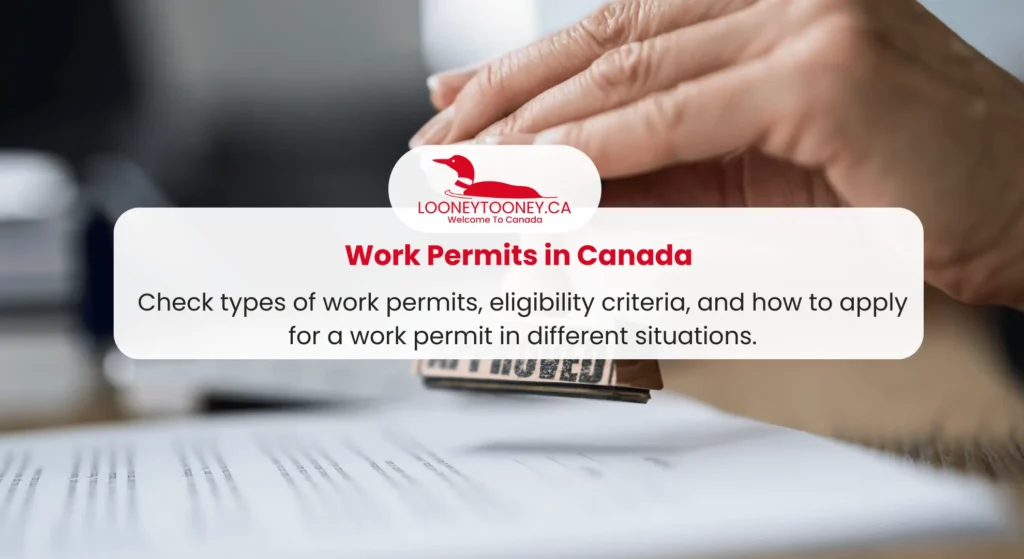Canada, with its diverse and thriving economy, attracts individuals from around the world seeking professional opportunities and a high quality of life. There are various types of work permits in Canada related to the Canadian immigration system. They are useful for different types of needs and circumstances. This comprehensive guide will talk about the eligibility criteria, and the process with types of work permits in Canada, providing valuable insights for individuals looking for employment in Canada.
Table of Contents
- What are the different types of work permits in Canada?
- Eligibility criteria for work permits in Canada for all applicants
- Eligibility criteria for Work Permits in Canada in different situations
- Eligibility criteria for an open work permit
- Eligibility criteria for an employer-specific work permit
- How to apply for a work permit?
- Work permits in Canada processing time
- Work permits in Canada: FAQs
What are Different Types of Work Permits in Canada?
There are two types of work permits in Canada, as listed below.
1. Open Work Permit
An open work permit is a type of work authorization that allows individuals to work for any employer, except those listed as ineligible due to non-compliance with certain conditions or those regularly involved in activities such as striptease, erotic dance, escort services, or erotic massages. Open work permits are only issued under specific circumstances.
Unlike other work permits, open work permits are not tied to a specific job, meaning employers are not required to obtain a labour market impact assessment from Employment and Social Development Canada or provide proof of submission of an employment offer through the Employer Portal along with the payment of the employer compliance fee.
Typically, individuals applying for an open work permit must also pay the open work permit holder fee concurrently with the work permit fee.
2. Employer-Specific Work Permit
A specific work permit tied to an employer authorizes you to work in Canada under the terms specified on your permit, including:
- The name of the employer you are permitted to work for.
- The duration of your authorized work period.
- Any location restrictions for your employment (if relevant).
Before seeking an employer-specific work permit, your employer is required to provide you with:
- A duplicate of your employment agreement.
- One of the following documents:
- Labor Market Impact Assessment (LMIA) obtained from your employer
- Offer of employment number (for individuals exempt from LMIA).
Your employer must obtain this number via the Employer Portal.
Eligibility Criteria for Work Permits in Canada for All Applicants
Applicants must meet specific eligibility criteria for work permits in Canada depending on their location when applying for a work permit. However, irrespective of the application location or the type of work permit sought, applicants must:
- Demonstrate to the officer their intention to depart Canada upon the expiration of their work permit.
- Show sufficient financial resources to support themselves and their dependents during their stay in Canada and for their return journey.
- Maintain a clean legal record and adhere to all laws; if necessary, provide a police clearance certificate.
- Pose no threat to the security of Canada.
- Be in good health and undergo a medical examination if required.
- Not intend to work for an employer designated as “ineligible” due to non-compliance with conditions.
- Not intend to work for an employer primarily engaged in activities such as striptease, erotic dance, escort services, or erotic massages.
- Furnish the officer with any additional documents requested to demonstrate their eligibility for entry into the country.
Eligibility Criteria for Work Permits in Canada in Different Situations
If You Apply From Outside Canada
For those applying from outside Canada, individuals may submit applications before they arrive in the country. However, specific visa office prerequisites may apply based on the applicant’s originating country or territory. Adherence to the provided application guidelines is essential.
It’s advisable to ascertain eligibility for faster processing under the Global Skills Strategy, which offers a two-week application timeline.
If You Apply From Inside Canada
Regarding applications made from within Canada, the following conditions must be met:
- Needs to have a valid study permit or work permit.
- A spouse, common-law partner, or parents with valid study or work permits.
- Eligibility for a post-graduation work permit with an active study permit.
- Possession of a temporary resident permit valid for at least six months.
- Awaiting a decision on a permanent residence application filed within Canada.
- Filed a claim for refugee protection.
- Recognition as a convention refugee or protected person by the Immigration and Refugee Board of Canada.
- Authorization to work in Canada without a work permit, albeit requiring one for a different job (excluding business visitors).
- Qualification as a trader, investor, intra-company transferee, or professional under the Canada – United States – Mexico Agreement (CUSMA).
If You Apply From a Port of Entry While Arriving in Canada
For applicants entering Canada at a port of entry (POE), it is advisable to apply for a work permit before arrival. However, eligibility allows for the submission of a work permit application upon entry into Canada.
To apply at a POE, applicants must fulfill the following criteria:
- Eligibility for an electronic travel authorization or visa-exempt travel (determine visa requirements).
- Meeting additional prerequisites depending on the type of work permit sought.
For employer-specific work permit applications, the employer must complete all necessary steps. Meanwhile, open work permit applicants must meet the criteria for such permits.
Eligibility Criteria for an Open Work Permits in Canada
You might qualify for an open work permit if you fall into one of the following categories:
- You are an international student who has graduated from a designated learning institution and meets the requirements for the Post-Graduation Work Permit Program.
- You are a student who is unable to afford the costs of your studies (destitute student).
- You hold a work permit tied to a specific employer in Canada and face workplace abuse or are at risk of it.
- You are a dependent family member of an individual who has applied for permanent residence.
- You are the spouse, common-law partner, or dependent child of a low- or high-skilled worker.
- You are the spouse or common-law partner of an international student.
- You are the spouse or common-law partner of an applicant for the Atlantic Immigration Pilot Program or the Atlantic Immigration Program.
- You are a refugee, refugee claimant, protected person, or a family member of one of these individuals.
- You are conditioned to an unenforceable removal order.
- You hold a temporary resident permit.
- You’re a young worker in special programs.
- You are in Canada and are sponsored as a spouse, common-law partner, conjugal partner, or accompanying dependent child.
Additional eligibility criteria must be met in each of these situations.
Eligibility Criteria for an Employer-Specific Work Permits in Canada
To be eligible under this, your employer needs to finish all the necessary steps for your employer-specific work permit to be processed.
There are two situations while hiring under an employer-specific work permit here-
- Hiring without an LMIA- in this case, an employer can hire through the International Mobility Program
- Hiring with an LMIA- in this case, hiring is done through the Temporary Foreign Worker Program
Let us discuss both of these cases one by one.
1. Hiring Without an LMIA
To hire a temporary foreign worker through the International Mobility Program, the employer typically needs to follow these steps:
- Pay the employer compliance fee of $230.
- Create and submit an offer of employment form via the Employer Portal. This form should include details about your business, the foreign worker you wish to hire, job specifics, as well as wage and benefits information.
Exemptions:
- Open work permit- If the temporary worker holds an open work permit, the employer is exempt from submitting an offer of employment or paying the compliance fee. Open work permits enable individuals to work for any employer in Canada.
- Other cases- Hiring by a foreign government or by an entity in charge of an international bridge or tunnel or by International missions or consular posts or by organizations acknowledged under the International Organizations Act.
After submitting the offer of employment: Once the employer has filed for the offer of employment through the Employer Portal, they will be getting an offer of employment number. The employer must provide this 7-digit number to the temporary worker they intend to hire. With this number, the worker can proceed to complete and submit their work permit application.
2. Hiring With an LMIA
Prior to hiring a temporary foreign worker, most employers need to acquire a Labour Market Impact Assessment. This assessment confirms the necessity of a temporary worker and verifies the unavailability of Canadians or permanent residents for the job. To determine if the employer requires an LMIA or if the employer and the prospective foreign worker are exempt, this should be done:
- Review the LMIA exemption codes and work permit exemptions.
- Select the most relevant LMIA exemption or work permit code and read its detailed description.
- If an exemption code applies, include it in your offer of employment.
OR
- If you’re hiring a temporary foreign worker who is currently outside Canada and from a country whose nationals are visa-exempt, you have to contact the International Mobility Workers Unit for further assistance.
To obtain an LMIA, you must apply through Employment and Social Development Canada (ESDC). The application process is listed below.
You can submit your LMIA application up to 6 months before the anticipated job start date. Here’s how to apply online:
Step 1. Create a Job Bank for Employers account if you don’t have one already. It takes about 10 minutes to register, and Job Bank may take up to 5 business days to process new employer files.
Step 2. Access the LMIA Online Portal using your Job Bank for Employers credentials for authentication.
Step 3. Submit your application:
- Fill out the application form for LMIA as shown on the portal.
- Upload any required documents supporting your business legitimacy, if applicable.
- Submit the application form, necessary documents, and processing fee through the LMIA Online Portal.
How To Apply for a Work Permit?
To apply for a work permit, you must complete the online application. Here are the application processes for a work permit according to different situations
Situation 1: Apply From Inside Canada
To apply for a work permit from inside Canada, online, follow the steps below-
Step 1. Log in or sign up for the IRCC portal
The first step is to create an account on the IRCC portal of Canada. If you already have one, just log on to it.
Step 2. Download the IMM 5556 also called Document Checklist
After logging in, download the personalized Document Checklist or IMM 5556 after answering questions on what are you applying for. This checklist is crucial as it will tell you the documents that you need while applying. Once you have this checklist, start collecting the documents as mentioned.
Step 3. Fill out the following forms
- IMM 5710 which is to “Change Conditions or Extend Your Stay in Canada”
- IMM 5409 which is the “Statutory Declaration of Common-law Union” (if it is applicable)
- IMM 5476 which is the “Use of a Representative” (if it is applicable)
- IMM 5475 which is the “Authority to release personal information to a designated individual” (if it is applicable)
Step 4. Payment of work permit fee
Here are the fees you need to pay with the application.
| Details | Amount |
| Work permit fee | CAD 155 |
| Open work permit holder fee | CAD 100 |
Step 5. Submit your work permit application
Finally, review your work permit application and submit it. Keep on checking it from time to time to know your work permit status.
Situation 2: Apply From Outside Canada
To apply for a work permit from inside Canada, online, follow the steps below-
Step 1. Log in or sign up for the IRCC portal
The first step is to create an account on the IRCC portal of Canada. If you already have one, just log on to it.
Step 2. Collect documents as per IMM 5488
After logging in, download the personalized Document Checklist or IMM 5556. This list contains instructions on the following documents
- Document on current immigration status
- Marriage certificate copy, if applicable
- Proof of meeting the offered job’s requirements
- A copy of LMIA, if applicable
- Offer of employment number, if LMIA is not applicable (we have discussed above how to generate this number)
- Any additional documentation as mentioned in the checklist
Step 3. Fill out the following forms
- IMM 5488 which is the “Application For Work Permit Made Outside of Canada ”
- IMM 5707 which is the “Family Information”
- IMM 5409 which is the “Statutory Declaration of Common-law Union” (if it is applicable)
- IMM 5476 which is the “Use of a Representative” (if it is applicable)
- IMM 5475 which is the “Authority to release personal information to a designated individual” (if it is applicable)
- IMM 5488 which is the “Document Checklist”
Step 4. Payment of work permit fee
Here are the fees you need to pay with the application.
| Details | Amount |
| Work Permit for one including extensions | CAD 155 |
| Work permit for a group of 3 or more performing artists including extensions | CAD 465 |
| Work permit fee | CAD 155 |
| Open work permit holder fee | CAD 100 |
| Biometrics fee for one | CAD 85 |
| Biometrics fee of one family of 2 or more people | CAD 170 |
| Biometrics fees applicable to groups of three or more performing artists. | CAD 255 |
Step 5. Submit your work permit application
Finally, review your work permit application and submit it. Keep on checking it from time to time to know when the work permit status changes.
Situation 3: Applying At a Port of Entry
Upon reaching the port of entry, inform the officer of your intention to obtain a work permit. The officer will then verify:
- Your passport or any other travel document.
- Your eligibility for the permit.
- The validity of your medical certificate if required.
If you are applying for an employer-specific work permit, and if your job necessitates a Labor Market Impact Assessment (LMIA), ensure you have the following documents:
- Your job offer.
- A copy of the LMIA.
- The LMIA number.
- Evidence demonstrating your qualifications and experience for the job.
For those intending to work in Quebec, you may also require an attestation of issuance of your Quebec Acceptance Certificate (CAQ) from the ministère de l’Immigration, de la Francisation et de l’Intégration. However, if you do not need an LMIA, a CAQ is not necessary for employment in Quebec.
If your job does not require an LMIA, ensure you have the following documents:
- Your job offer.
- The offer of employment number is provided by your employer.
- Evidence confirming that an LMIA is not required for the job.
- Proof of meeting the qualifications and experience for the position.
Work Permits in Canada Processing Time
The processing time for a work permit varies depending on several factors such as the country of application, type of permit, and current immigration workload. The work permit processing time from inside Canada, including initial and extension is 97 days. For work permit applications from outside Canada, the processing time differs from country to country.
To sum up, getting a work permit in Canada requires following strict rules and providing the right documents. There are two main types of permits: the open work permit and the employer-specific work permit. Each has its own rules. Knowing these rules well is important for applying them successfully. It helps make sure your application goes smoothly and you get the permit you need to work in Canada.
Work Permits in Canada: FAQs
Q. What are the prerequisites to obtain a work permit in Canada?
A. Applicants must meet eligibility criteria for work permits in Canada, including demonstrating intent to leave Canada, financial stability, legal compliance, security clearance, good health, and adherence to employer regulations. Additional documents may be required.
Q. How much is a Canadian work permit application fee?
A. The work permit application in Canada requires a work permit fee of CAD 155 and an open work permit holder fee of CAD 100.
Q. How many types of Canadian work permits are available?
A. There are two types of work permits that one has to apply for in Canada, an open work permit and an employer-specific work permit.
Q. Do I need a job offer for a Canadian work permit?
A. Yes you need a job offer for a Canadian work permit.
Q. Is there a minimum age limit for getting a work permit in Canada?
A. Yes, the minimum age limit for a work permit in Canada is 18 years.
Also, check:





